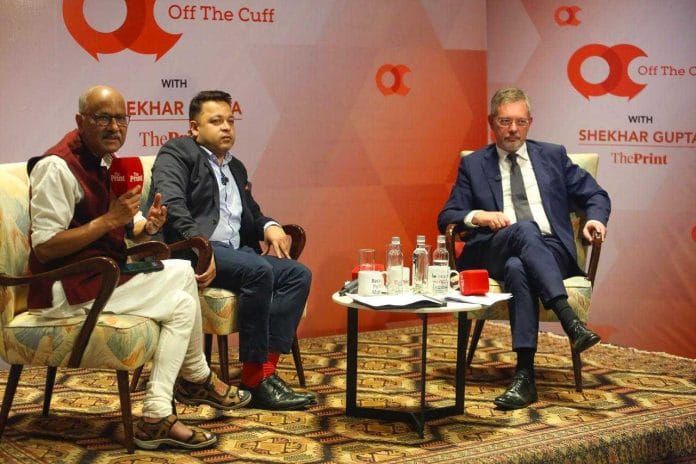Gurugram: Underlining that oil will never be off the table, Russia’s Ambassador to India Denis Alipov said that if India by any chance decides to suspend its purchase of Russian oil, there are “others” who will buy it.
His comments at the ThePrint’s marquee event Off the Cuff, held at the Quorum Club in Gurugram, comes ahead of the 21 November deadline when new sanctions on Russian oil firms imposed by the Trump administration along with the European Union (EU) come into effect, potentially cutting Indian imports from Russia.
Alipov seemed to be suggesting that Chinese oil refiners will continue to mop up Russian crude from the market despite the latest sanctions imposed by the US, UK and the European Union (EU) on Russia’s largest oil producers Rosneft and Lukoil last week.
“On oil, I think we have something like 8 percent to 12 percent share of global oil production. If you remove this share from the global market, the markets will become unsustainable. This will not happen in any case. India, if it stops buying oil from us (and) making profit from those discounts we offer, somebody else will do that and will benefit. So Russian oil will stay in the market,” Alipov said in conversation with ThePrint’s Editor-in-Chief Shekhar Gupta and Snehesh Alex Philip, Editor, Defence and Diplomacy.
The Russian envoy added: “If it is not India, then somebody else (will purchase Russian oil). This is up to you to decide. India is buying oil (or) not buying Russian oil not for the sake of us. You are buying it for the sake of yourselves. It’s very erroneous and deplorable to say that India supports Russia so that we have the money to continue in Ukraine.”
Sanctions imposed by Washington D.C. are expected to deter companies and governments from purchasing oil from sanctioned firms given the large reach of the American financial markets.
India’s Reliance Industries, for example, has a contract to purchase roughly 5,00,000 barrels of oil per day from Rosneft, according to reports. However, the sanctions imposed by the US can affect this, given that any trade with Rosneft or Lukoil after 21 November opens up Indian firms to potential secondary sanctions by the US government.
While reports indicate that Indian refiners are rethinking the purchase of Russian oil, Chinese refiners such as Yulong Petrochemical are set to ramp up their imports of crude from Moscow, according to Reuters. Yulong was recently sanctioned by the UK.
Alipov is confident that these latest sanctions will no “longer have any effect” on Russia’s policies. The Russian envoy highlighted that around “30,000 sanctions have already been imposed” on Moscow’s economy, which has not impacted its policy with regards to the war with Ukraine.
“The packages the Europeans introduced, those sanctions the Americans imposed from time to time, currently these efforts are just adjustments to what had been introduced already…. Nothing new in that. And I think this experience has shown that this mechanism is not working. It will not change our policy,” said Alipov.
The almost four-year long Russia-Ukraine war has seen Kyiv receive billions of dollars of support from Western countries and the North Atlantic Treaty Organisation (NATO). India has maintained that “dialogue and diplomacy” is the only way to end the war.
Since the beginning of the war, India’s purchases of discounted Russian oil have increased significantly. In the 2024-2025 financial year, Indian refiners imported crude worth roughly $56 billion from Russia. This grew from around $3.1 billion in the 2019-2020 financial year. In the 2021-2022 financial year, India’s purchases of Russian crude grew to around $5 billion.
The US under President Donald J. Trump has been pressuring India to stop its purchase of Russian oil. Trump’s adviser Peter Navarro in August asserted that the ongoing Russia-Ukraine war is “Modi’s War”. New Delhi has maintained that its purchase of energy from global markets is based on prevailing prices and is non-political.
Russian oil accounts for roughly 36 percent of India’s total crude imports, according to estimates published by Bloomberg. For India, Russian oil comes at a discounted rate owing to two reasons: The G7 price cap implemented at the end of 2022, and the discounts offered by Moscow beyond the cap.
The price cap implemented by the G7 members was designed to ensure India’s energy independence, while also stabilising global oil markets, the former US ambassador to India Eric Garcetti has publicly stated multiple times.
(Edited by Viny Mishra)

Also read: Is India recalibrating Russian oil import strategy? Saudi Arabia discount offer is key






